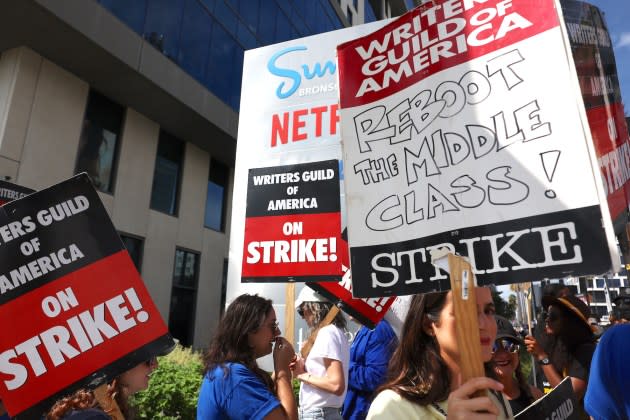Inside the Strike-Breaking WGA Contract: AI, Streaming, and Staffing

After nearly five months of chanting and marching on nationwide picket lines, the Writers Guild of America strike has come to an end, with writers permitted to return to work on Sept. 27.
The WGA and the Alliance of Motion Picture and Television Producers (AMPTP), representing Hollywood studios and streamers, came to a tentative three-year agreement Sunday. The WGA leadership and negotiating committee voted unanimously Tuesday to recommend the agreement and lift the work restraining order. Next, the union’s full membership will cast votes from Oct. 2 to Oct. 9 to ratify the contract.
More from Rolling Stone
“What we have won in this contract — most particularly, everything we have gained since May 2nd — is due to the willingness of this membership to exercise its power, to demonstrate its solidarity, to walk side-by-side, to endure the pain and uncertainty of the past 146 days,” read a WGA statement shared with union members.
It was a grueling work stoppage that came just a week shy of surpassing the longest writers’ strike in history back in 1988. Following a meeting with Hollywood’s top dogs in August, the writers’ union received a duplicate counteroffer designed to “get us to cave,” wrote the negotiating committee in a press release. And after resuming talks last week and making progress on the union’s key issues, one WGA request on refusing to cross other picket lines almost derailed the deal.
After early protests at studio headquarters and late nights at the bargaining table, the writers’ union and Hollywood executives were able to reach a deal. Here are the big items included in it.
STREAMING AND COMPENSATION
Streaming services are on the rise. Netflix has already axed its DVD rental service as viewers turn to online content. For big streaming services like Netflix and Max, writers will now receive an 18% wage increase for TV shows or films that are at least 96 minutes long. They’ll also get a 26% hike in residual base pay, or a payment made to TV and film workers for reruns.
The program, however, has to have a budget of $30 million or more. In May, writers asked for better compensation and residual checks on shows with at least $12 million budgets.
Writers will also be given viewership bonuses for working on hit shows and movies released on streaming services. So, if a program is viewed by at least 20% of subscribers within its first 90 days of release (or “the first 90 days of any subsequent exhibition year”), writers get a bonus “equal to 50% of the fixed domestic and foreign residual.” That could mean a $9,031 bump for a half-hour episode, $16,415 for a one-hour episode, or $40,500 for a streaming feature with at least a $30 million budget, according to the WGA.
Staff writers will receive a 5% weekly rate increase, whereas story editors and executive story editors will receive a 3.5 to 4% increase. The WGA had previously asked for a 6% increase for staff writers, and a 5% bump for story editors and executive story editors.
MINIMUM STAFFING
Writers had expressed concerns with understaffed writers rooms that can lead to burnout during and after production. The new contract guarantees at least three writers for a six-episode series, which slices the union writers’ request in half. (Writers had previously asked for at least six writers for a six-episode series.) The new agreement also includes five writers for a 7 to 12 episode series and six writers for shows with more than 13 episodes.
When it comes to weeks on the payroll, both sides agreed that staffers will get at least 10 consecutive weeks of work while a show is in production. Post-production, writers are also guaranteed “at least 20 weeks or the duration of the post-greenlight room, whichever is shorter,” according to the summary agreement.
ARTIFICIAL INTELLIGENCE
From the beginning, writers and Hollywood studios have struggled to agree on the use of artificial intelligence. The WGA and AMPTP have agreed that AI cannot be considered a writer within TV and film projects, and AI-generated material is not considered literary material or assigned material. On the other hand, writers can choose to use AI if they please, but cannot be forced to use AI software by a company. If anything is written by AI, then the company must notify the writer in advance.
As writers celebrate their historic win, unionized actors (or SAG-AFTRA) will continue to march. On Tuesday, the actors union had yet to confirm any future meeting dates with Hollywood executives.
Best of Rolling Stone
